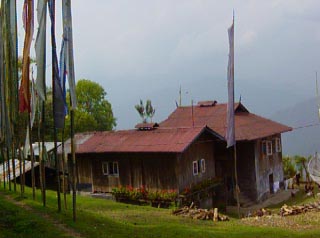Reviving Tradition and Empowering Communities
Reviving Tradition and Empowering Communities
SF is dedicated to revitalizing traditional craftsmanship, creating sustainable livelihoods, and preserving cultural heritage through community-driven initiatives like the Borong-Polok Handmade Paper Unit.
SF is dedicated to revitalizing traditional craftsmanship, creating sustainable livelihoods, and preserving cultural heritage through community-driven initiatives like the Borong-Polok Handmade Paper Unit.
Our work
SF exists to improve the living standard and quality of life for the people of Sikkim, particularly for women, children, minorities, and other disadvantaged sections of society. We promote environmentally and economically sustainable, self-reliant community development projects, ensuring they reflect the needs and aspirations of the community.

Sikkim and Australia Citrus Improvement Project
Agriculture and Horticulture developement
The "Project for Improving Sub-Tropical Citrus in Sikkim & Australia," spearheaded by the Sikkim Development Foundation in partnership with the Australian Center for International Agricultural Research (ACIAR) and local agricultural bodies, aimed to address the challenges faced by the citrus industry in Sikkim.

Sikkim and Australia Citrus Improvement Project
Agriculture and Horticulture developement
The "Project for Improving Sub-Tropical Citrus in Sikkim & Australia," spearheaded by the Sikkim Development Foundation in partnership with the Australian Center for International Agricultural Research (ACIAR) and local agricultural bodies, aimed to address the challenges faced by the citrus industry in Sikkim.

Sikkim and Australia Citrus Improvement Project
Agriculture and Horticulture developement

IEC Strategy for Wok-Sikip BAC
Community Empowerment
The IEC Strategy for Wok-Sikip Block Administrative Center (BAC), represents a targeted initiative to enhance water, sanitation, and waste management in the region through innovative Information, Education, and Communication (IEC) strategies.

IEC Strategy for Wok-Sikip BAC
Community Empowerment
The IEC Strategy for Wok-Sikip Block Administrative Center (BAC), represents a targeted initiative to enhance water, sanitation, and waste management in the region through innovative Information, Education, and Communication (IEC) strategies.

IEC Strategy for Wok-Sikip BAC
Community Empowerment

Gangtok water supply and sanitation project
Water Sanitation & Hygeine
he Gangtok Water Supply and Sanitation Project (GWSSP), spearheaded by the Sikkim Development Foundation, aimed at revolutionizing water supply and waste management systems in Arithang, a bustling suburb of Gangtok, Sikkim.

Gangtok water supply and sanitation project
Water Sanitation & Hygeine
he Gangtok Water Supply and Sanitation Project (GWSSP), spearheaded by the Sikkim Development Foundation, aimed at revolutionizing water supply and waste management systems in Arithang, a bustling suburb of Gangtok, Sikkim.

Gangtok water supply and sanitation project
Water Sanitation & Hygeine

Gangtok School Sanitation and Hygiene Project
Community Empowerment
The Gangtok School Sanitation & Hygiene Project, was a pioneering initiative aimed at upgrading sanitation facilities and promoting hygiene practices in several government schools within Gangtok, Sikkim.

Gangtok School Sanitation and Hygiene Project
Community Empowerment
The Gangtok School Sanitation & Hygiene Project, was a pioneering initiative aimed at upgrading sanitation facilities and promoting hygiene practices in several government schools within Gangtok, Sikkim.

Gangtok School Sanitation and Hygiene Project
Community Empowerment

Sarva Shiksha Abhiyan’s Civil Works in Sikkim
Research, Evaluation and Policy Advocacy
The "Evaluation of Schools under Sarva Shiksha Abhiyan" project undertaken by the Sikkim Development Foundation highlights a critical review of the construction and infrastructure developments in schools across Sikkim.

Sarva Shiksha Abhiyan’s Civil Works in Sikkim
Research, Evaluation and Policy Advocacy
The "Evaluation of Schools under Sarva Shiksha Abhiyan" project undertaken by the Sikkim Development Foundation highlights a critical review of the construction and infrastructure developments in schools across Sikkim.

Sarva Shiksha Abhiyan’s Civil Works in Sikkim
Research, Evaluation and Policy Advocacy

Village Tourism and Micro Enterprise Initiatives
Sustainable Livelyhood and Ecotourism
In the picturesque landscapes of South Sikkim, the Village Tourism and Micro Enterprise Initiatives project stands as a prime example of how integrated community engagement and sustainable practices can rejuvenate rural economies.

Village Tourism and Micro Enterprise Initiatives
Sustainable Livelyhood and Ecotourism
In the picturesque landscapes of South Sikkim, the Village Tourism and Micro Enterprise Initiatives project stands as a prime example of how integrated community engagement and sustainable practices can rejuvenate rural economies.

Village Tourism and Micro Enterprise Initiatives
Sustainable Livelyhood and Ecotourism

Kewzing Homestay Initiative
Sustainable Livelihood and Ecotourism
In South Sikkim, the Kewzing Village Home Stay initiative showcases how community-driven efforts, supported by SF and the Kewzing Tourism Development Committee, transformed the village’s socio-economic landscape through sustainable tourism.

Kewzing Homestay Initiative
Sustainable Livelihood and Ecotourism
In South Sikkim, the Kewzing Village Home Stay initiative showcases how community-driven efforts, supported by SF and the Kewzing Tourism Development Committee, transformed the village’s socio-economic landscape through sustainable tourism.

Kewzing Homestay Initiative
Sustainable Livelihood and Ecotourism

Borong-Polok Handmade Paper Unit
Community Empowerment
The Borong-Polok Handmade Paper Unit is a community-based micro-enterprise, established in 2003 with support from SF, involving over fifty local families who contributed as little as Rs 500 and in-kind support like materials and labor.

Borong-Polok Handmade Paper Unit
Community Empowerment
The Borong-Polok Handmade Paper Unit is a community-based micro-enterprise, established in 2003 with support from SF, involving over fifty local families who contributed as little as Rs 500 and in-kind support like materials and labor.

Borong-Polok Handmade Paper Unit
Community Empowerment

Sikkim Ornithological Society Initiative
Environmental Conservation
The Sikkim Ornithological Society (SOS), blending scientific research with eco-tourism, showcases how targeted efforts can foster sustainable environmental stewardship and enhance local livelihoods.

Sikkim Ornithological Society Initiative
Environmental Conservation
The Sikkim Ornithological Society (SOS), blending scientific research with eco-tourism, showcases how targeted efforts can foster sustainable environmental stewardship and enhance local livelihoods.

Sikkim Ornithological Society Initiative
Environmental Conservation